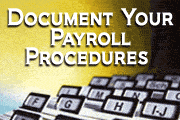Payroll Documentation
Best-Selling Training Courses:
Instructor-Led: Webinars
How To Document Your Payroll Procedures
The employer or the payroll staff must ensure that all employees' paychecks are accurate and timely.
Payroll is a key aspect of any business with employees. In order for employees - and payroll taxes - to be paid on time and accurately, the payroll department must be structured, with documentation spelling out the organization's payroll-related processes and procedures.
Such documentation is especially helpful during audits to show your organization has stated processed for comply with the myriad of payroll rules, as well as when the payroll person is sick, injured, or on vacation!
What Are The Major Reasons Why Employers Get Their Payrolls Audited?According to ADP, these are five primary mistakes that employers make that can lead to a payroll audit:
- Misclassifying employees
- Sloppy or incomplete records
- Missing federal deposit deadlines
- Failing to report all taxable forms of compensation
- Misprocessing garnishments
What Are The Common Payroll Penalties?Payroll penalties apply for many reasons, even for an inadvertent mistake. Here are the most-common:
- Late filing
- TIN matching
- Errors on returns
- Failure to pay overtime
- Failure to pay timely
But did you know that some of these penalties can be appealed or waived with a show of good cause? Click below for our recommended training courses, or read the bottom of this page for additional info on payroll documentation.
For Training On How To Document Your Payroll Procedures
Featured Course:
How To Document Your Payroll Procedures This training session covers the steps you can take to insure that your payroll procedures are well documented, clear, and concise. It covers:

- Best methods for how to document your procedures, starting with the basics of any payroll manual
- The key points that should be included in each procedure: when is your information provided too much versus not enough
- The resources that can be used so that you are not reinventing the wheel
- Tips to save you time and energy when documenting your procedures
More Details / Order:
http://www.PayrollTrainingCenter.com/showWCtDetails.asp?tcid=1000389Best-Selling Training Courses:
Instructor-Led: Webinars
Find Seminars, Webinars, And Online Training In Your Area
More About Proper Payroll Documentation, Identifying And Avoiding Payroll Problems, And Getting Penalties Waived If You Do Get Fined
What Documents Do Employers Need In Case Of Payroll Audit? A payroll audit is an analysis of a company's payroll processes to ensure accuracy. Payroll audits examine things like the business' active employees, pay rates, wages, and tax withholdings, such as:
- Payroll records
- Unemployment tax returns
- Tax reports (Federal Payroll 940s or 941s)
- General ledger, subcontractor ledgers, and journals
- Certificates of insurance for subcontractors
- Workers' Compensation insurance policy
- Employee information
- Corporate officer information
- Audit package totals
- Subcontractor information
- Certificates of insurance for each subcontractor
What Goes Into A Payroll Audit? In order to know which documents are needed, employers must know what information is collected during a payroll audit. Payroll generally includes employee and employer data.
Employee information includes employee name, address, Social Security number, date of birth, mandatory deductions such as payroll taxes and wage garnishment, pay rate & frequency, earnings such as regular and overtime wages, employee benefits such as retirement contributions and health insurance premiums, and bank account information for direct deposit purposes.
Employer information includes the employer's payroll liabilities, such as federal and state unemployment taxes, Medicare and Social Security taxes, the amount the employer pays for employee benefits such as 401k match and health insurance, and in some cases, the employer's bank account information.
What Kind Of Records Do I Need To Keep? - Names, addresses, and Social Security numbers of all employees
- Workweek information (e.g., start and end dates)
- Hours worked each day/total hours worked each week
- How each employee is paid (e.g., hourly, salary)
- Pay rate
- Overtime earnings (if applicable)
- Additions to or deductions from wages
- Total wages paid each period
- Payment dates and pay periods
- Form W-2
- Form W-4
- Forms 941 or 944
- Records of benefits
Which Laws Dictate Payroll Recordkeeping Rules? Payroll record retention keeps you compliant with the IRS. And, you must have records if you get audited by the IRS.
The Fair Labor Standards Act also requires that you keep payroll records. You need to keep identifying information about each employee as well as information about the hours they work and their pay.
To prevent discrimination in the workplace, the Equal Employment Opportunity Commission (EEOC) requires you to keep employment records. Records can prove or disprove that there was discrimination involved with an individual's termination.







